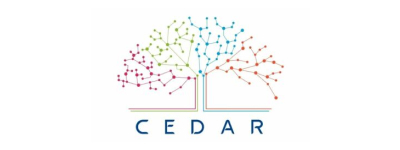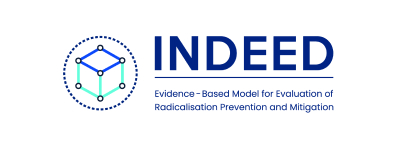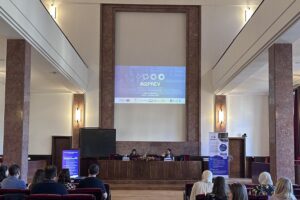The Council of Europe organised a significant gathering centred around Preventing and Countering Violent Extremism in Western Balkan countries. IPS CEO Pedro das Neves took part in the event and stressed the imperative of collaborative integrated efforts and forward-looking strategies in the continuous endeavour to prevent and address radicalisation within the region.
The Western Balkans grapple with a diverse landscape of extremism, characterised by various forms and drivers of radicalisation, including violent right-wing extremism, violent Islamist extremism, and violent ethno-nationalist extremism.
The capital of Montenegro, Podgorica, served as the host for the “Coordination meeting with international partners on Preventing and Countering Violent Extremism (P/CVE) in the Western Balkans”.
Taking place on May 11th, 2023, this pivotal international gathering aimed to address the intricate challenge of radicalisation and violent extremism in the Western Balkans.
The event was organised within the framework of the regional action plan titled “Enhancing co-operation in the Western Balkans in managing violent extremism in prisons and preventing further radicalisation after release”, which is being executed as part of the third phase of the Horizontal Facility Programme for the Western Balkans and Turkey.
Funded jointly by the European Union and the Council of Europe, this initiative has been carried out in close partnership with the Ministries of Justice and the P/CVE coordination mechanisms of Albania, Bosnia and Herzegovina, Kosovo, Serbia, Montenegro, and North Macedonia. It also engages a wide spectrum of pertinent regional stakeholders and civil society organisations.
In response to these threats, the Council of Europe has been actively working in the region, employing a multifaceted approach that encompasses legal and policy frameworks, penitentiary capacities, and education.
As an important actor in the prevention and countering of radicalisation and extremism, the Council of Europe provides invaluable expertise and guidance on developing effective legal and policy frameworks.
These frameworks are designed to thwart the spread of extremist ideologies and promote inclusive, democratic values. One of the focal points of the Council’s efforts is the enhancement of penitentiary capacities to effectively address radicalisation within prison environments across the Western Balkans.
In addition, the Council of Europe supports the education and youth sectors to foster democratic citizenship and human rights awareness. By nurturing an environment that encourages open dialogue and critical thinking, these efforts aim to steer young minds away from the allure of extremist ideologies.
This international meeting was a testament to the collective commitment of international partners to address the pressing challenges posed by radicalisation and violent extremism in the Western Balkans region.
The EU, in partnership with the Council of Europe, is actively backing projects and initiatives that empower Western Balkan partners to prevent and counter radicalisation leading to violent extremism and terrorism.
IPS’ representation at the event was a significant moment, underscoring a dedication to driving innovation in the realm of prison systems, offender rehabilitation and reintegration, and the prevention of radicalisation.
Pedro das Neves’ insights underscored IPS’s contribution to tackling the complex issue of radicalisation within prison systems, through different transnational projects with a special focus on tangible solutions that aid in risk assessment, offender reintegration and the prevention of radicalisation. He highlighted that this is an area that demands interdisciplinary collaboration and forward-thinking strategies.
On behalf of the HOPE project – Holistic Radicalisation Prevention Initiative – led by IPS_Innovative Prison Systems, the CEO participated in a panel alongside representatives from the Council of Europe, the European Commission, The Global Community Engagement and Resilience Fund (GCERF), and the International Organisation for Migration.
As he remarked: “We particularly looked at the ongoing and future support to the Western Balkans beneficiaries, with an emphasis on addressing radicalisation in prisons and handling violent extremist prisoners and offenders”.
The meeting featured discussions, presentations, and joint panels, serving as a platform to exchange insights and ideas that contribute to ongoing efforts to curb radicalisation in the region, thus fostering safer, more inclusive communities in line with citizens’ rights and European values.
“We discussed the synergies and complementarity between different actions and initiatives in the P/CVE field within prison systems in the region”, explained Pedro das Neves, inviting all interested parties to explore what IPS and project partners are developing through the implementation of the HOPE – Holistic Radicalisation Prevention Initiative.
Know more about this project

DIGIDEM
Fostering Digital Democracy and Citizenship in Higher Education
HOPE is led by IPS_Innovative Prison Systems (Portugal) in partnership with organisations from several countries, namely the University College of Norwegian Correctional Service (Norway), Agenfor International Foundation (Italy), the Euro-Arab Foundation for Higher Studies (Spain), the Bulgarian Association for Policy Evaluation (Bulgaria), the Bulgarian General Directorate “Execution of Sentences” (Bulgaria), the Bucharest-Jilava Penitentiary (Romania), the Helsinki Committee for Human Rights in Serbia (Serbia) and the Slovenian Probation Administration (Slovenia).
For more information about the HOPE project and the HOPE Radicalisation Prevention Network, go to www.hope-radproject.org
Related projects

CEDAR
Continuing Education Against Radicalisation

COOPERHATE
Delivering a comprehensive approach to preventing, reporting, investigating and prosecuting hate crime and hate speech-related incidents in Portugal

EUTEx
Developing a European framework for disengagement and reintegration of extremist offenders and radicalised individuals in prison

FUTURE-ART
Sentinels of the Future: Together to Eradicate Human Trafficking

IN2PREV
Law enforcement and community cooperation and training approach to prevent radicalisation by ensuring refugees’ successful inclusion

INDEED
Strengthening a comprehensive approach to preventing and counteracting radicalisation based on a universal evidence-based model for evaluation of radicalisation prevention and mitigation

INTEGRA
Integrated Community, Probation and Prison Services Radicalisation Prevention Approach

KOBAN
Identifying future capabilities for Community Policing

MIRAD
Multi-Ideological Radicalisation Assessment towards Disengagement

PARTES
Participatory Approaches to Protecting Places of Worship
Related news

IN2PREV Final Conference highlights cross-sector collaboration for refugee inclusion and radicalisation prevention
Read More »
Standing united against hate: A national effort to prevent and tackle hate crime and hate speech in Portugal
Read More »
New IPS-led initiative unites efforts to protect religious communities, schools, and places of worship
Read More »
IPS contributes to shaping EU’s future agenda on radicalisation prevention at Brussels Town Hall meeting
Read More »
Advancing rehabilitation and countering contemporary extremist threats: IPS at the EU Knowledge Hub on Prevention of Radicalisation Thematic Panels
Read More »



